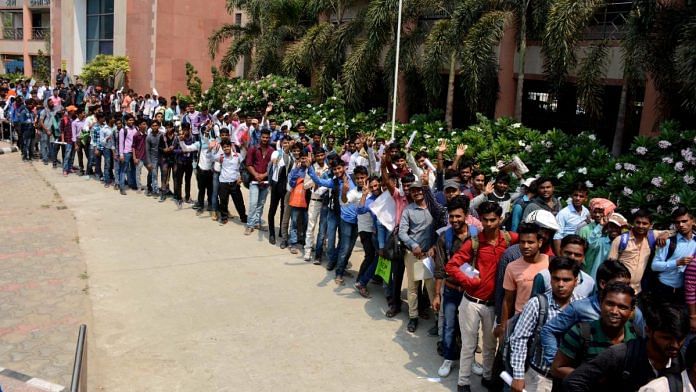Thank you dear subscribers, we are overwhelmed with your response.
Your Turn is a unique section from ThePrint featuring points of view from its subscribers. If you are a subscriber, have a point of view, please send it to us. If not, do subscribe here: https://englishdev.theprint.in/subscribe/
Job creation is an integral part of any economy & India is no exception. A growing economy is expected to create jobs with wages on par with the minimum living standards of a country. In India, the scenario is quite perplexing as on one hand we tout ourselves as the fastest growing major economy & on the other sufficient jobs are not created leading to increase in inequality. For this scenario to be properly understood first we need reliable data on whether jobs are really being created or not & if jobs are available but there is a dearth of Job seekers.
Let us first examine the sources of data on jobs– one is a periodic labour force survey conducted by the National Statistical Office & the other is data provided by a private organization called Centre for Monitoring Indian Economy (CMIE). Both follow different methodologies in publishing the data- the major difference being CMIE bases its unemployment rate on whether the working class is seeking employment or not. Even among the government agencies i.e., RBI & NSO there is a wide discrepancy in the figures of number of new jobs created. Additionally, conflicting narratives are sought to be created using the data based on which side of the political divide you are in. Due to this, the issue of jobs occupied the centre stage during the campaign for the recently held Lok Sabha elections.
The very fact that the growth rate recorded by the Indian Economy would have been possible without the creation of jobs defies logic, as many sectors of the economy have undergone transformation over the past decade. It is apparent that either the system is not able to capture the employment generated or people are simply not seeking employment. The present situation is a result of both the above scenarios. The major reasons for people not seeking work are the doles given by the government in the form of freebies & the lack of adequate skills in meeting job requirements. There is a total mismatch in the skill requirement & the curriculum being taught. In such a situation, responsibility lies on regulators like AICTE (All India Council of Technical Education) to interact with industry organizations & make the necessary changes in the curriculum regularly in the near to medium term. Still in the event of skills being matched, people are not joining owing to their expectations for better pay. Recently, eight thousand IIT freshers not being placed is a point in this regard.
It is pertinent to mention that there is a huge requirement of cybersecurity professionals since there is a digital transformation. Similarly, the recently introduced three new criminal laws require increased number of forensic science professionals. Also, India’s burgeoning semiconductor & electronics manufacturing sector requires 63 lakh workers, manages & engineers within the next 18 to 24 months (Source: Economic Times 21st July 2024). Hence there is a need for a focused awareness campaign to disseminate information & undertake massive skilling Programme to meet the demand.
Finally, we need reliable data to track employment generation. One method could be to include the data on new jobs created & total number of cumulative jobs in a financial year in the IT Returns filed by both companies & individuals. The present system of tagging the Employees Provident Fund accounts does not give the correct picture as many employers are operating below the Provident fund threshold. The data must be transparently put in the public domain for stakeholder feedback & subsequent policy formulation. These steps will go a long way in effectively tackling the issue of job creation.
These pieces are being published as they have been received – they have not been edited/fact-checked by ThePrint


